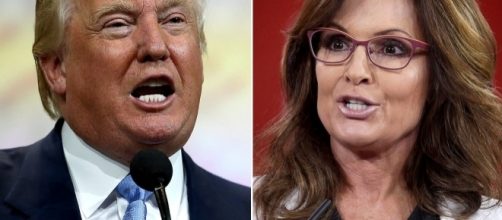When Donald Trump made it official that he was running for president last year, most members of the media and political pundits didn't think he had much of a chance at success. Fast forward to present day and Trump is set to accept the Republican nomination, while also deciding on his running mate.
Palin denies Trump
Earlier this year, former half-term Alaska Gov. Sarah Palin became one of the earliest big name Republicans to endorse Trump for president. Over the last seven months since her public support of Trump, Palin has appeared at various campaign rallies in an attempt to win over the Tea Party crowd for the billionaire real estate mogul.
Palin has gotten so involved with the Trump campaign that there was speculation that the failed 2008 vice presidential candidate would get another shot at joining the GOP ticket. After the news broke that Trump was set to pick Indiana Gov. Mike Pence as his running mate, Palin reportedly turned down a shot at speaking at the upcoming Republican National Convention, as reported by Politico on July 14.
.@realDonaldTrump: Palin not attending RNC because Alaska 'a long ways away' https://t.co/oWhnBDd2G2 | AP Photo pic.twitter.com/5aOfXYcxVa
— POLITICO (@politico) July 14, 2016
In an interview with The Washington Examiner, Trump said that Palin "was asked" to attend and speak at the convention, but turned down the campaign's offer.
"We love Sarah. Little bit difficult because of, you know, it's a long ways away," Trump said. While Trump used Palin's home in Alaska as an excuse, citing the long distance, it hasn't stopped her from campaigning during the year. Making stops in Florida and Oklahoma on the campaign trail, a trip to Cleveland, Ohio shouldn't seem that much different for such a historic occasion.
Breaking News: Donald Trump’s campaign has signaled he will pick Gov. Mike Pence of Indiana as his running mate https://t.co/02P8gJw51i
— The New York Times (@nytimes) July 14, 2016
Election status
With Palin out of the picture, a Trump/Pence ticket is set to grace the stage the convention, and then move on to the general election against Democratic nominee Hillary Clinton.
While Clinton has not yet decided on her running mate, the race is expected to be tight until Election Day this November. Recent polls show the former Secretary of State with a slim lead, holding an advantage over Trump by less than five points. Where Trump is hurting the most is with minority groups, important voting blocs that can make or break a campaign. Seventy percent of women and Hispanics have an unfavorable view of Trump, but his numbers dip even further with black voters. Trump's approval with African-American voters in the swing states of Florida and Ohio registered as zero, with no black voters surveyed giving him their support.

